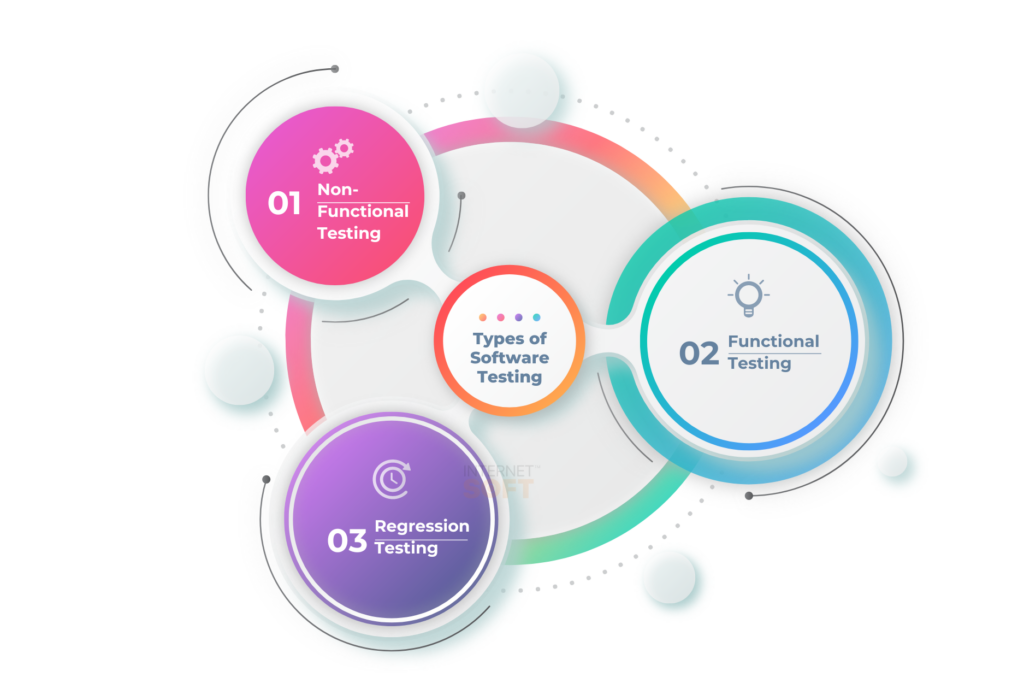Introduction
Today every software gets launched as a service or product with well well-tested approach and strategy. Testing is necessary for quality awareness and quality control for any software product or service. Software without testing is a soulless process. This highlights the timeless need for the process called software testing.
Testing is the fundamental activity aimed at detecting and resolving technical issues in the software source code and assessing the overall product usability, performance, security, and compatibility. It’s the main part of quality assurance. It is an unavoidable part of the entire software development process.
At Internet Soft, a leading software development company in California, we deliver a secured and seamless tested software solution as well as services. Let us explore here the best Practices for Creating an Effective Software Testing Strategy.
Understanding the Implication of QA Testing:
Quality Assurance testing is the bedrock of any successful software development endeavor. It is the meticulous process through which every facet of a software product is scrutinized to ensure it meets the highest standards of quality. For software development companies, particularly those operating in the dynamic environment of California, where innovation and competition are at their peak, the importance of QA testing cannot be overstated.
In the bustling tech hubs of California, where cutting-edge technologies and groundbreaking ideas are born every day, software developers face intense pressure to deliver flawless products that not only meet but also exceed user expectations. This is where a well-defined QA strategy becomes a strategic asset. It serves as the compass that guides the development team through the complex landscape of coding, debugging, and testing, ensuring that the end product is not only functionally impeccable but also capable of standing tall amidst the fierce competition.
A well-executed QA strategy encompasses a wide array of activities, from setting clear objectives and defining the scope of testing to selecting the right tools and continuously improving the testing processes. It’s the shield that safeguards the reputation of a software development company, guaranteeing that its products are free from debilitating bugs, security vulnerabilities, and performance bottlenecks.
Unlock the potential of your Android app with our expert developers.
Hire Android Developer for seamless innovation and unparalleled performance!
In essence, QA testing in California’s software development ecosystem is not just a best practice; it’s a survival strategy. It ensures that companies not only stay relevant but also thrive in an environment where the next groundbreaking innovation is just around the corner. By embracing QA testing, these companies can confidently march forward, knowing that their software products are of the highest quality, and their reputation is secure in the fiercely competitive landscape.
- Define Clear Objectives:
Drafting clear objectives for the QA testing is important. This comprises the scope of testing, identifying the success parameters, and planning expected outcomes. With all clear-cut objectives, we can ensure that our testing efforts are in line with our project’s goals.
2. QA Services Collaboration:
Coping with professional QA service providers can be a key factor for California-based software development companies. These experts know the specific challenges and industry trends, providing valuable insights and resources to improve our QA processes.
- Automation Testing Solutions:
Automation testing is a powerful tool for boosting the efficiency and effectiveness of QA efforts. It is suitable for software development companies who needs to deliver products rapidly without altering the quality.
- Selection of the Right Tools:
Selecting suitable automation testing tools is important. Depending on our project’s requirements and our team’s expertise, tools such as Selenium, Appium, or JUnit may be suitable choices. Ensuring that our team is expert with the selected tools is essential for success.
- Test Automation Framework:
Creating a powerful automation testing framework. It will be reused across projects as a best practice. This framework must give standardized guidelines, libraries, and resources, making it smooth to maintain and scale automated tests effectively.
- Constant Integration (CI) and Constant Deployment (CD):
Integrating automated tests into our CI/CD pipeline is essential for detecting errors/ bugs early in the development process. This practice declines the cost and tasks required to fix bugs discovered afterward in the development cycle. This ensures a seamless deployment process.
- Building an in-depth Test Suite:
An entire test suite is compulsory for thorough testing. It embraces multiple types of testing to ensure the software’s reliability, functionality, and performance.
A. Functional Testing:
Functional testing involves evaluating individual software functions to ensure they work as they are intended. This includes unit testing, integration testing, and system testing. Properly described test cases and scripts are important for effective functional testing.
B. Non-Functional Testing:
Connecting with non-functional testing is essential to assess aspects other than functionality. Performance testing detects how well the software performs under many conditions, security testing detects vulnerabilities, and usability testing confirms a positive user experience.
C. Regression Testing:
Regularly doing regression testing is vital to confirm that new code changes do not bring in any new defects in the existing functionality. Automation can do this process.

- Collaboration and Communication:
Cooperation and communication are key to a successful software testing strategy.
- Early Involvement:
Engaging QA teams from the project’s inception allows them to familiarize project requirements and subsequently plan testing activities. This early engagement can control misunderstandings.
- Agile Methodologies:
Adopting agile methodologies like Scrum or Kanban encourages cooperation and flexibility in our development process. Agile encourages regular interactions among team members, including the QA team, developers, and product owners, raising effective communication and fast adaptation to changes.
- Continuous Learning and Improvement:
To remain in the competitive business scenario in the ever-evolving field of software development, continuous learning and knowledge upliftment are essential. Investing in present training and skill enhancement programs for our QA teams confirms they stay updated with the latest testing methodologies and technologies. This investment in our team’s knowledge and expertise directly facilitates the quality of our products. By applying lessons learned from retrospectives, we can continually refine our testing processes.
Conclusion
In conclusion, an efficient software testing strategy holds paramount importance for software development companies, especially in the competitive landscape of California. By diligently adhering to the best practices elucidated in this blog, such as establishing transparent objectives, wholeheartedly embracing automation, constructing a complete test suite, promoting robust collaboration and communication among teams, and consistently pursuing learning and improvement, these companies can fortify their position in the industry. With a commitment to quality assurance and continuous refinement of their testing processes, they are equipped to deliver high-quality software solutions that meet or exceed customer expectations.
Visit Internet Soft for the latest tech trends and insights around AI, ML, Blockchain, along with NeoBanking and timely updates from industry professionals!
Need assistance or have questions? Reach out us at sales@internetsoft.com.
ABOUT THE AUTHOR

Abhishek Bhosale
COO, Internet Soft
Abhishek is a dynamic Chief Operations Officer with a proven track record of optimizing business processes and driving operational excellence. With a passion for strategic planning and a keen eye for efficiency, Abhishek has successfully led teams to deliver exceptional results in AI, ML, core Banking and Blockchain projects. His expertise lies in streamlining operations and fostering innovation for sustainable growth







